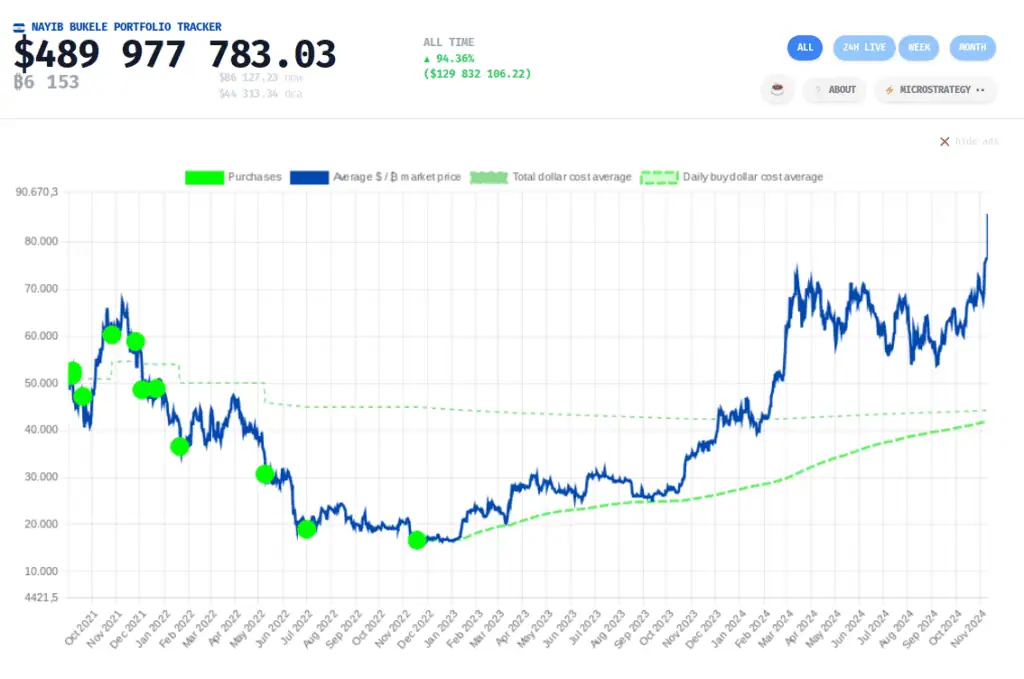
Countries like El Salvador, the United States, and Bhutan are taking positions in what could soon become the biggest global trend: creating Strategic Bitcoin Reserves.
In an era marked by global economic volatility and political uncertainty, the idea of transforming the current economic and financial order with the use of Bitcoin and the creation of Strategic Reserves is gaining increasing traction. The global financial crisis, geopolitical tensions and the search for safe and stable alternatives have led governments to explore new frontiers in the management of their foreign exchange reserves.
Hence, Bitcoin, the world's most recognized and valuable cryptocurrency, is emerging as an attractive and promising option. In fact, countries such as El Salvador, the United States, and Bhutan are leading the way towards an unprecedented global financial change, proving that the adoption of Bitcoin as a strategic reserve is not just a possibility, but a reality in the making, especially now that Bitcoin has already surpassed the $86.000 USD barrier.
El Salvador: pioneer in Bitcoin adoption
And in this race to generate Strategic Reserves we have a clear pioneer: El Salvador. This Central American country was the first country to adopt Bitcoin as legal tender in September 2021This decision, driven by President Nayib Bukele, has been a milestone in the history of crypto activism. The Salvadoran government has acquired 6153 BTC, which represents an investment of around 529 million at the current market value, and which has brought the country a net profit of more than 150 million dollars.

Bitcoin adoption in El Salvador has not only sought to diversify the country’s foreign exchange reserves but also to foster financial inclusion. With a large portion of the population lacking access to traditional banking services, the implementation of Bitcoin has allowed Salvadorans to transact more efficiently and cheaply. Additionally, the country has attracted the attention of international investors and fostered the development of a blockchain-based technology ecosystem.
United States: A Strategic Approach to its Strategic Reserves
Meanwhile, although the United States has not adopted Bitcoin as legal tender, government interest in cryptocurrencies has increased significantly. According to recent data (Arkham), the United States owns 207.189 Bitcoins, which is equivalent to an investment of $17,735 billion. This position is the result of a combination of direct acquisitions and the participation of American companies in the cryptocurrency market.
The US interest in Bitcoin is reflected in the statements of prominent political figures. For example, the recently elected President Donald Trump has promised to maintain a Strategic Reserve of Bitcoin. Trump has advocated for Bitcoin mining on US soil, arguing that if the US doesn't do it, China will. In addition, Senator Cynthia Lummis has proposed legislation that seeks to reduce the national debt by purchasing 1 million Bitcoins over a five-year period.

The adoption of Bitcoin by the United States could have significant implications globally. As the world’s largest economy, any move in the direction of cryptocurrencies could influence the monetary and financial policy of other countries.
Bhutan: an example of innovation
And most recently, a small Asian country has joined the club of those betting everything on having Strategic Bitcoin Reserves: Bhutan. This small country located in the Himalayas has surprised the international community with its innovative approach to Bitcoin. The economic crisis caused by the COVID-19 pandemic has led the Bhutanese government to look for alternatives to diversify its sources of income. As a result, Bhutan has taken advantage of its surplus energy resources to mine Bitcoin.
According to data from Arkham Intelligence, Druk Holdings, the entity that manages the Bhutanese government’s Strategic Cryptocurrency Reserves, holds 12.568 Bitcoins, representing an investment of approximately $1,033 billion. In addition, Bhutan has diversified its portfolio with other cryptocurrencies, including Ethereum and local tokens.

Bhutan's strategy not only seeks to strengthen its foreign exchange reserves, but also to encourage technological development and innovation. The country has shown that even with limited resources, it is possible to take advantage of the opportunities offered by the world of cryptocurrencies.
Global economic and political impact
All this aside, the decision by governments to create Strategic Bitcoin Reserves has profound implications in both the economic and political realms. This move not only redefines foreign exchange reserve management strategies, but also has the potential to transform the global economic and political order.
For example, the creation of Bitcoin Strategic Reserves can provide an alternative to traditional fiat currencies such as the US dollar, euro, or Japanese yen. Bitcoin’s scarcity, with a maximum supply of 21 million coins, makes it resistant to inflation, which can be attractive to countries looking to protect their wealth against the devaluation of their national currencies. Additionally, diversifying foreign exchange reserves with Bitcoin can help reduce reliance on a single currency and mitigate the risks associated with foreign exchange market fluctuations.
On the other hand, Bitcoin adoption can foster financial inclusion, especially in countries where a large portion of the population does not have access to traditional banking services. Bitcoin allows for faster, safer, and cheaper transactions, facilitating the sending of remittances and access to loans and other financial services. In El Salvador, for example, Bitcoin adoption has allowed Salvadorans to conduct international transactions more efficiently, reducing costs and transfer times.
Attracting investment and boosting technological development
Furthermore, the creation of Bitcoin Strategic Reserves can attract the attention of international investors and foster the development of a blockchain-based technological ecosystem. Countries that adopt Bitcoin as a store of value can become innovation hubs, attract talent and capital, and develop industries related to cryptocurrencies and blockchain technology. This can lead to job creation and economic growth, especially in emerging sectors.
Likewise, Bitcoin adoption can reduce reliance on fiat currencies, especially the US dollar, which has been the dominant reserve currency for decades. This can be particularly relevant for countries seeking greater financial autonomy and reducing their exposure to other countries’ monetary policies and sanctions. Diversifying foreign exchange reserves with Bitcoin can provide greater flexibility and control over domestic economic policies.
More decentralization and autonomy
In terms of political impact, keep in mind that Bitcoin’s decentralized nature eliminates the need for intermediaries such as central banks or governments, which reduces susceptibility to political manipulation. This may be especially attractive to countries seeking greater autonomy and control over their finances. Thus, adopting Bitcoin as a store of value can strengthen economic sovereignty and reduce the influence of foreign powers on domestic economic decisions.
Furthermore, Bitcoin adoption can foster the formation of new international alliances and cooperation. Countries that share similar interests in cryptocurrency adoption can collaborate on technological projects, regulations, and economic policies. This can lead to the formation of economic and political blocs based on blockchain technology, which could redefine international relations and the global balance of power.
Finally, Bitcoin adoption also poses regulatory challenges and the need for international cooperation. Governments must develop clear and consistent regulatory frameworks to ensure the security and stability of the financial system. International cooperation in cryptocurrency regulation can be crucial to prevent money laundering, terrorist financing, and other illegal activities. Furthermore, standardization of regulations can facilitate international cryptocurrency trading and transactions.
New challenges and opportunities
Despite the potential advantages, the adoption of Bitcoin as a Strategic Store of Value also presents challenges. The volatility of the cryptocurrency market remains a major concern. Governments must balance long-term benefits with short-term risks. Furthermore, cryptocurrency regulation remains a complex issue, with different approaches in different countries.
However, the potential benefits outweigh the challenges. Bitcoin adoption can foster innovation, financial inclusion, and economic stability. Countries such as El Salvador, the United States, and Bhutan are proving that diversifying foreign exchange reserves with Bitcoin is a viable and promising strategy.



